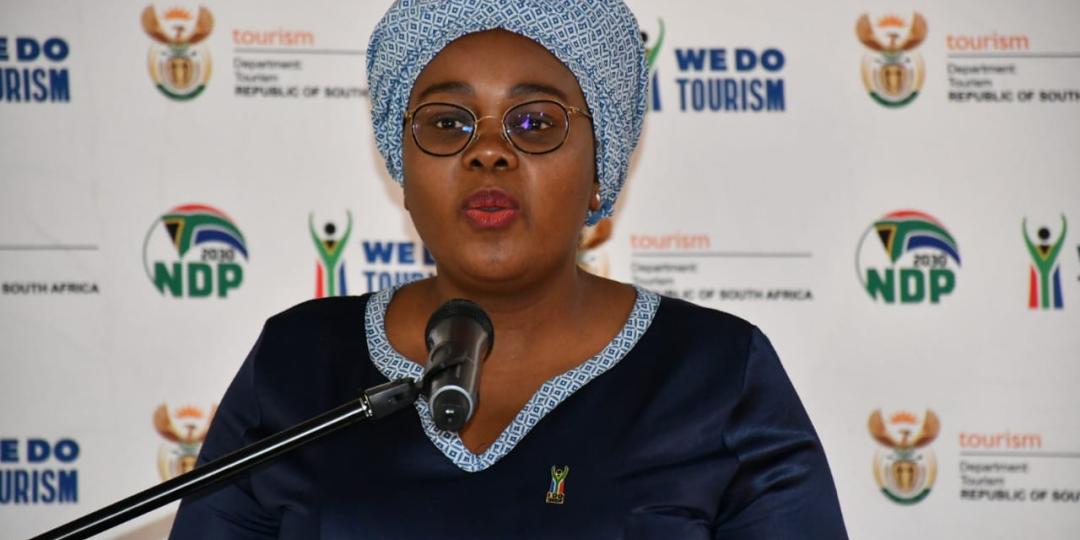Minister of Tourism, Mmamoloko Kubayi-Ngubane, announced at a press briefing today (May 31) her department was set to defend the court case brought against the implementation of the Tourism Equity Fund (TEF) by lobby group Afriforum and trade union Solidarity.
In April, the Pretoria High Court interdicted the processing of applications for the TEF, ruling that it was necessary to temporarily halt the processing of TEF until such time that the main application in the matter can be heard.
“At the time, we announced that we would abide by the court order as we considered our options. Today, we announce our intentions to defend the main case in court regarding the constitutionality of the criteria for the TEF,” said Kubayi-Ngubane.
As part of the main court application, AfriForum and Solidarity are contesting the legality and rationality of the 51% black-owner/managed qualification criteria for the fund. They suggest it deviates materially from the Broad-Based Black Economic Empowerment (B-BBEE) Act, read with the Tourism Code.
The Code prescribes a formula for allocating points for B-BBEE compliance. The TEF intends to fund – to the tune of R1.2 billion (€71.53m) – majority black-owned and black management-controlled tourism enterprises (minimum 51%) in accommodation; hospitality and related services; and travel and related services, products and initiatives.
This will be achieved through a combination of grant funding, concessionary loans and debt finance to support equity acquisitions and new and expansion developments in the tourism sector.
The Minister explained during her initial meeting with AfriForum and Solidarity – the two parties had agreed to meet with her before proceeding with their threats of legal action – they were of the view that the TEF should be re-purposed to provide for financial relief to businesses affected by COVID-19, arguing that transformation of the sector should be secondary to the COVID-19 relief measures.
Opposing views
This is a view shared by many Tourism Update readers with many echoing development specialist Adrienne Harris’s words: “I don't think that the Minister realises that any B-BBEE is useless if there is no industry. Please, Minister, sort out all the issues that are hampering tourism growth (not just in COVID times) and then return to this focus. You are currently trying to redistribute a cupcake – let's rather bake a proper cake first.”
Travel destination specialist, Alan Roxton Wiggill, said in an earlier comment to Tourism Update: “We are in a devastated tourism market and we are shrinking the cake instead of growing it where it is most beneficial to all South Africans. We have placed transformation ahead of growing the industry, thus hurting the very people that such a fund should support – transformed tourism SMMEs with solid partnerships to help these businesses to survive and grow.”
Many readers agree with the need to transform the industry but also question the timing, with Chief Executive of SME TradeLinks, Dr Salifou Siddo, noting earlier this year: “To those emerging entrepreneurs who have only known frustration and disappointment in trying to secure funding to grow their assets, this new fund offers hope; but many in the industry, given the devastation that COVID has visited on tourism businesses, see the introduction of TEF at this point as a misguided initiative, as it is only open to black-owned entrepreneurs.”
‘Remain steadfast’
Kubayi-Ngubane, while acknowledging that the tourism sector had been devastated by the impact of COVID-19, noted that the sector – based on State of Transformation of Tourism reports – had already called for such a fund as far back as the 2016/17 financial year.
“There was no doubt as to the policy intention of the Tourism Equity Fund, which is to boost sector transformation. The TEF is not blind to the impact of COVID-19, but supports transformative and inclusive reconstruction the tourism sector.
“We must re-emphasise that our efforts to transform the sector remain steadfast. By providing access to finance for black-owned commercially viable tourism projects, the TEF intends to address one of the significant challenges to the transformation of the tourism sector,” said the Minister.
She further pointed out that South Africa was still considered by the World Bank as one of the most unequal countries in the world. “Our economy does not equally benefit all its citizens, which we cannot be proud of.”
The Department of Tourism’s latest surveys, conducted independently throughout the industry, indicates the following about the state of transformation in the tourism sector:
- The majority of tourism enterprises have not met the 30% ownership target as per the Tourism B-BBEE Codes, according to the 2018 State of Tourism Transformation Report.
- There is still a limited number of medium-sized businesses owned and controlled by black people in the tourism sector, let alone large businesses.
- Most black entrepreneurs indicated that access to funding had been the main challenge for them to either acquire equity in existing businesses or start new businesses in the sector, as revealed by the 2017 Tourism Transformation Summit.
- The existence of mainly family-owned businesses that may not always seek to do business with the Government drags transformation efforts as there is no incentive to transform in such instances.
- Many entrepreneurs point to a funding gap and demand for collateral whether they are dealing with commercial banks or Development Finance Institutions (DFIs) alike.
“As our legal team prepares to present and represent us in yet another court battle on transformation of the tourism sector, we do so with our unwavering resolve that the fund is a necessary intervention, within the constitutional values and imperatives for the creation of an equal society and addressing the imbalances of our country’s past,” said Kubayi-Ngubane.























